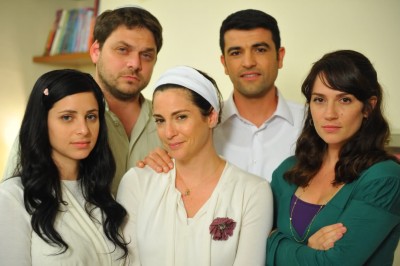I’ve just spent three weeks completely glued to an Israeli show called Srugim. To be honest, I’ve been completely obsessed and of course, now wish I had spread it out over a longer period of time.
Srugim was broadcast in Israel between the years of 2008-2011. The plot revolved around a group of friends in Jerusalem — Yafit, Amir, Nati, Reut and Hodaya– all in their 20s, all single, all Orthodox Jews, all looking for meaning of life and love but with Jewish rituals in mind. Kind of Friends, kind of Sex and the City with a Jewish slant.
I first became aware of the show after reading a post by Slate TV critic Willa Paskin about the show in which she described it like this:
Srugim’s characters are far less conflicted than their American sitcom peers about what they want—a family—but this is not as retro as it sounds. (The women in Srugim are also, relatively speaking, feminists: They have careers they care about, want to be able to read Torah, and have equal if not greater say in their romantic relationships.)
Religious feminists? I had to see what it was all about so I immediately downloaded it and subscribed to Hulu and sat down to view the show, not knowing what to expect. Having once lived in Jerusalem in my 20s, I was enamored with the characters’ lifestyle and conversations, in addition to getting a glimpse of a city I once lived in and adore, along with the dynamics of seeing Israeli life played out on TV.
But even more so, I was interested in the three main female characters, Yafit, Hodaya and Reut and how they each dealt with real life issues – from work to romance to religion. For each of them, whether they were aware or not, feminism played a real role in every decision they made – despite their religious or traditional beliefs, and it was played out in different ways. I would expect that if you asked each one if they are a feminist, they would have been indifferent, but for me, I was able to read between the lines and find the silver lining.
Three Feminists
Yafit, who serves as the group’s voice of reason and backbone of the group, is the most observant of the three, having been raised quite religious and has adhered to her strict views of kashrut, halachot and Jewish law as an adult most strictly in her home (which is also where the characters meet up most of the time). She is the first to marry, the first to have children, the first to make sure her house is completely Kosher. But after marrying a grammar school teacher (in season 2), who struggles financially and is more interested in serving the world than making a fortune, she takes a full-time job (she’s a graphic artist) and continues to work after having a baby. Work is important to her and she’s not willing to give it up to play the traditional role as mother and wife.
Hodaya, her best friend, goes from being religious to non-religious during the first season. She spends the course of the show’s next two seasons sorting out her career, going from one boyfriend to another, trying to figure out the meaning of life. She’ was actually my favorite character as she was most relatable to me personally. She falls deeply in love with Avri, a non-religious man, early on and when they finally get together and decide to marry, she backs out last minute, basically jilting him at the alter. At first, I was mortified by her decision. He was the full package – handsome, smart, successful, loving. But after she confides in Yafit that she can’t get married until she figures out who she is, I understood. Who wants to stand in the shadow of a successful man for the rest of her life? The path she takes to find herself is extraordinary and it’s done completely on her own terms. She goes from being a Biblical Studies Masters Degree studier to working in a pub to teaching in a religious school for girls to becoming a radio show star in Tel Aviv. Along the way, she picks up a tattoo, moves in and out of her own apartment for financial reasons, and accidentally finds herself along the way.
Reut makes kiddush at Shabbat dinner, something traditionally done by men. She learns how to read Haftorah to recite at her father’s memorial, something also traditionally recited by men. She works at a very successful accounting firm, where she is boldly working her way up to partner. She turns down a marriage proposal in the first episode of the first season by a guy who declares his promotion is putting his salary in front of hers. She buys her own apartment in season 3, paying the deposit all in cash. Determined not be outdone by a man, she is waiting for real love and isn’t willing to compromise. She wants to meet someone and settle down but isn’t willing to settle, and in the end, her destiny has been standing in front of her all along.
The show’s feminism is subtle and not overt, but it’s extraordinary in what it is trying to tell us about Israeli society today. If you look between the lines while watching the show (which I hope you do), you will see what I see: a depiction of times that are changing for women in Israel and in our Jewish society.








 Follow
Follow





Speak Your Mind